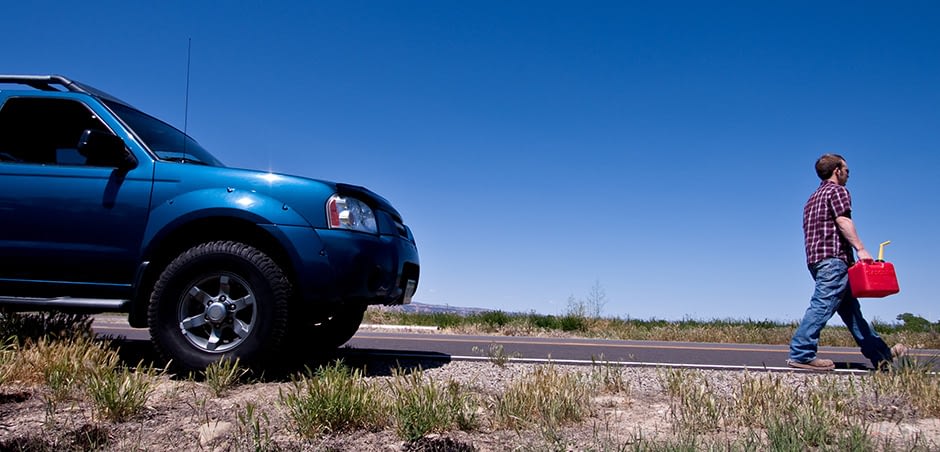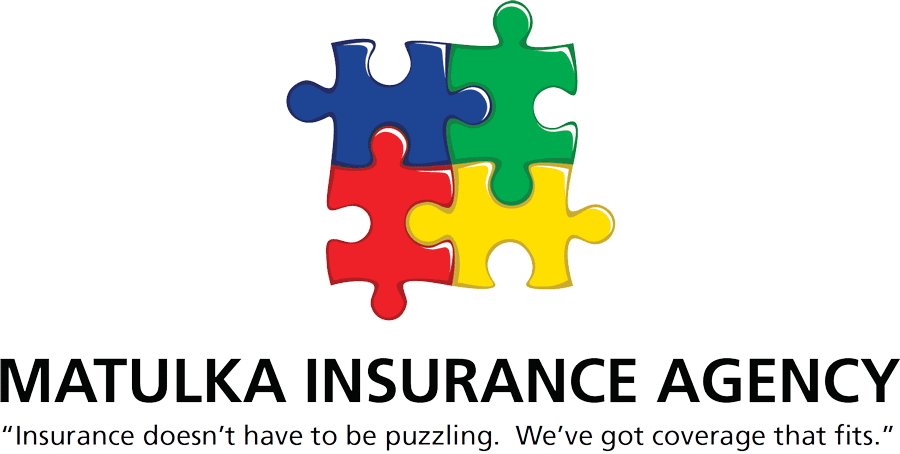
Bad habits. We all have them. And sometimes, they can be hard to shake. This is especially true when it comes to driving. Depending on how many years you’ve spent behind the wheel, certain habits may be deeply ingrained by now. And many of them can be bad for your car.
Wondering if there are any bad driving behaviors you’ve picked up over the years? Check out our list of 13 habits that aren’t good for your car.
Driving on empty
Whether you’re running late and forget to fill up, or you’re just not paying attention to your fuel gauge, finding yourself low on gas can happen from time to time. But running out of gas is more than just inconvenient; it can also be hard on your car.
Why? Because critical components, like your vehicle’s fuel pump, aren’t designed to operate without gas. The fuel pump is submerged in the gas tank, where it uses fuel to cool and lubricate the mechanisms in the pump. Most fuel pumps can last for the life of your vehicle.
But when you run your car on empty, the pump can overheat, which could lead to a costly failure. And because the gas tank typically needs to be drained and removed to replace the pump, this labor-intensive job could cost upward of $1,000 to repair.
Read more: Is Driving On Empty Really That Bad?
Revving a cold engine
It’s no fun getting into a freezing cold car. But you should know there are no shortcuts to warming up a cold vehicle. So never rev up the engine in an effort to get the heat flowing faster. Doing this will only cause excess wear and tear on your engine because the cold engine oil isn’t at the right temperature to properly lubricate all its internal components.
Read more: How to Help Your Car Recover from Winter
Delaying maintenance
Every vehicle manufacturer recommends following a routine maintenance schedule to keep your car running in tip-top shape. In the short term, it may seem like there’s no harm in skipping an oil change, air filter replacement or tire rotation. But the truth is, taking care of these preventative maintenance tasks now can save you from needing major repairs later.
Ignoring warning lights
Modern cars feature a host of warning lights, and each is there to notify you of a particular problem with your vehicle. Ignoring these warning lights could leave you with a major repair down the road. Depending on the problem, it could even jeopardize the safety of you and your passengers.
So don’t make a habit of ignoring your vehicle’s warning lights. The next time that “check engine” light starts flashing, consult your car’s manual and if need be, take your car to a qualified mechanic to get it checked out.
Driving through deep water
If you approach any kind of flooding, including large puddles of groundwater, you may be tempted to drive right through. But your best—and safest—course of action is always to turn around and find another route. What may not seem like a lot of water can in fact be quite dangerous when you’re behind the wheel.
For starters, it can be hard to gauge how deep the water is, and you can’t see what debris or other hazards may be below the water.
See also: Here’s Why You Should Never Drive Through a Flash Flood
On top of that, driving through deep water can damage or destroy your vehicle’s engine, transmission and other critical components. It can also cause irreversible damage to your car’s complex electrical system. Because of this long-lasting damage, a flooded vehicle is often considered a total loss by insurance providers.
Not checking your tire pressure
One of the easiest car maintenance tasks to ignore is checking your tire pressure. After all, if your tire isn’t flat, what’s the big deal? But not running your tires at the manufacturer’s recommended air pressure can cause a host of problems ranging from premature or uneven tire wear to bad handling and poor fuel economy.
For that reason, experts recommend that you make a habit of checking your tire pressure once a month. And remember that when it’s cold, your tire pressure will drop between one and two pounds per square inch (PSI) for every ten-degree decrease in temperature. So pay extra attention to your tires as the seasons change.
Read more: How Cold Weather Affects Tire Pressure
Riding the brakes
Your car’s brakes represent one of its most important safety systems. But hitting the brake pedal too hard, or using the brakes too often, can leave this system severely compromised.
For example, applying the brakes for a prolonged period of time (like when slowing your car down a long hill) can cause them to overheat. And when your brakes get too hot, their stopping power is greatly reduced.
Overuse of your brakes can have long-term consequences, too. More braking means you’ll wear through pads and rotors faster, which translates to more frequent service intervals. You can also expect to pay more at the pump, thanks to lower fuel economy caused by frequent braking.
To “break” this bad habit, try to leave some extra space between you and other cars on the roadway. And if you’re descending a long hill, try shifting your car out of overdrive and into a lower gear; this will allow the engine to do some of the braking for you.
Ignoring a windshield chip
You’re driving along when suddenly you hear a loud noise. Whack! A rock hits your windshield.
You scan your windshield for signs of damage and discover the impact only left a small chip. It’s barely noticeable, so there’s no point in getting it repaired, right? Wrong.
The truth is, leaving a windshield chip will increase the likelihood that the damage will get worse. Weather changes or simply driving over a pothole, speed bump or uneven terrain puts additional pressure on the edges of a chip, which can quickly turn into a crack.
Repairing a chip is always less expensive than doing a full windshield replacement. It typically takes less than 30 minutes. And in most states where Erie Insurance does business1, comprehensive coverage from ERIE will cover the cost to repair a cracked or chipped windshield without charging you the deductible.
Learn more about what to expect when filing a glass claim.
Not regularly washing your car
Everybody can appreciate how good a freshly washed car looks. But the benefits of a clean vehicle extend far beyond the visual appeal. If you go long periods of time without washing your car, all that dirt and grime will embed itself in the painted surfaces and will eventually eat away at the clear coat, causing permanent damage.
The consequences are even greater if you live in an area that uses road salt to melt the ice and snow. That’s because salt creates chemical reactions that can corrode the components on your car. This is especially true for any exposed metal, like brake lines and fuel lines.
Read more: Here’s What Road Salt Does to Your Car
Shifting without coming to a complete stop
If you drive a car with an automatic transmission, you may have fallen into the bad habit of shifting from “reverse” to “drive” while the car is still moving.
Even if you’re moving backward at a slow speed, switching gears without coming to a complete stop puts extra stress on your car’s drivetrain—particularly the transmission. And chances are, the few seconds you save in the process aren’t worth the cost of a premature transmission service, which can cost $2,000 or more.
Driving too fast over speed bumps
Speed bumps are installed to help slow down traffic, making areas safer for pedestrians. If you drive over a speed bump at a slow speed, your car will be unharmed. But hit a speed bump faster than about 10 miles per hour, and you can do serious damage to your car.
The sudden impact of a speed bump could cause your suspension to bottom out, damaging your shocks and struts. It could also bend other important suspension components or knock your car out of alignment. So take it slow!
Hitting potholes
If you live in an area that sees cold winters, the constant freeze-thaw cycles can make potholes a common sight on the roadways. When driving, you should do your best to avoid hitting them at all costs.
Potholes can cause damage to your vehicle ranging from flat tires or bent wheels to much pricier damage to your suspension, steering system or exhaust system. Next time you encounter a pothole, try to swerve around it. If swerving isn’t possible, reduce your speed to lessen the impact—and any potential damage.
See also: What to Do If You Get a Flat Tire
Letting your car sit for long periods
Parking your car for extended periods of time can take its toll on your vehicle. The time it takes for your vehicle to be damaged by long-term storage will vary based on several factors, including the location of your parked car and how well you’ve prepared it.
However, the negative effects of time on an undriven vehicle can be observed sooner than you may think. (Learn how long your car can sit without driving it.)
When your car is left undriven, the fuel and battery can go bad. Tires and rubber belts can crack. Rust can begin to form. And rodents could even make your car their new home.
See also: Is There a Mouse Living In My Car?
If you have a college student away, for example, consider using a battery maintainer while the car sits. Since maintainers are used for maintenance during periods when cars aren’t going to be used, time isn’t of the essence when charging. This means that a maintainer can give a battery a “low and slow” charge, which is better for its health than a faster charge or a jump.
Auto Insurance You Can Trust
At ERIE, we believe reliability isn’t just important for cars. You should be able to count on your insurance company, too. When you purchase auto insurance from ERIE, we commit to being there when you need us—and we’ll get you back on your way, right away. To learn more, talk to a local ERIE agent in your neighborhood.
1 In New York, you must purchase Full Window Glass Coverage in order to have the repair feature without a deductible. Full Window Glass Coverage is not available in North Carolina. In Kentucky, glass is considered safety equipment; under comprehensive coverage, no deductible applies for a repair or replacement if only safety equipment is damaged (even if the loss is caused by a collision).

A better insurance experience starts with ERIE.
Haven’t heard of us? Erie Insurance started with humble beginnings in 1925 with a mission to emphasize customer service above all else. Though we’ve grown to reach the Fortune 500 list, we still haven’t lost the human touch.
Contact Matulka Insurance Agency today to experience the ERIE difference for yourself.
